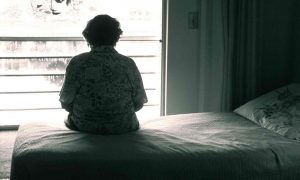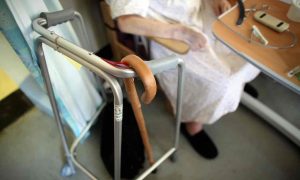Latest News
Three-quarters of older people in the UK are lonely, survey finds
Almost three-quarters of older people in the UK are lonely and more than half of those have never spoken to anyone about how they feel, according to a survey carried out for the Jo Cox commision on loneliness.
The poll by Gransnet, the over-50s social networking site, also found that about seven in 10 (71%) respondents – average age 63 – said their close friends and family would be surprised or astonished to hear that they felt lonely.
Gransnet is one of nine organisations – including Age UK, the Alzheimer’s Society and the Silver Line helpline for older people – working to address the issue of loneliness in older people, which is the current focus of the commission, set up by Cox before her murder last June.
They are urging individuals and businesses to look for signs of loneliness and refer people to organisations that can help. But they also want people to take time to speak to neighbours, family, old friends or those they encounter randomly.
The chairs of the cross-party commission, the Labour MP Rachel Reeves and Conservative MP Seema Kennedy, said there was a stigma around loneliness that must be tackled.
“We all need to act and encourage older people to freely talk about their loneliness,†they said. “Everyone can play a part in ending loneliness among older people in their communities by simply starting a conversation with those around you.
“How we care and act for those around us could mean the difference between an older person just coping, to them loving and enjoying later life.â€
Almost half (49%) of the 73% who described themselves as lonely in the online poll said they had been so for years, 11% said they had always felt lonely and 56% said they had never spoken about their loneliness to anyone.
Laura Alcock-Ferguson, the executive director of the Campaign to End Loneliness – another organisation working with the commission – said the percentage of lonely older people had stayed the same for five decades, but an ageing population meant the number was increasing in absolute terms.
“Loneliness is a serious public health issue and dealing with it will take the strain off the NHS and social care services,†she said.
Common trigger events said to have contributed to feelings of loneliness were bereavement, retirement and children leaving home. Being shy, living alone or far from family and low income were other commonly cited contributory factors.
The rise of social networking to the detriment of face-to-face interaction has been blamed for contributing to an “epidemic†of loneliness, but the survey of just over 1,000 people found it could also offer solace.
Almost three in five respondents (59%) said social media helped people feel less lonely and about eight in 10 (82%) said talking about loneliness was much easier when anonymous and online.
While the results indicate the potential benefits of online interaction, the older people are the less likely they are to have access to the internet, particularly women.
The commission is encouraging supporters and followers to post #happytochat on social media to create discussion around loneliness and for people to wear badges with the same slogan. Ultimately, they hope some customer-facing organisations will encourage their staff to wear the badges.
Respondents highlighted greater public awareness – a key goal of the commission – as the best way to combat loneliness.
Caroline Abrahams, charity director at Age UK, said: “There are reasons to believe that we can all do something to change things for the better: a simple thing like saying hello and having a chat can brighten up an older person’s day and do more good than most of us would ever guess.â€
In coming months the commission will focus on loneliness in other groups, including men, people with disabilities, carers, refugees, children and parents.

Thousands of vulnerable people held unlawfully in care homes – report
Tens of thousands of vulnerable people with dementia and learning disabilities are being detained unlawfully in hospitals and care homes across Britain, the Law Commission has said.
Replacing the “administrative and bureaucratic nightmare†system of deprivation of liberty safeguards (DoLS) would speed up checks and allow care workers to concentrate on those most at risk, the legal study recommends.
The report, put before parliament on Monday, is an attempt to relieve pressure on the overburdened care system, which has been strained by the UK’s growing elderly population and a recent human rights court victory.
Individuals who lack sufficient mental capacity are subject to movement controls, usually for their own safety, which prevent them from wandering off and getting into danger.
In 2014, a supreme court judgment dramatically expanded the definition of those who should be subject to DoLS checks beyond hospitals to care homes and other types of accommodation.
As a result, while there were 13,700 applications for deprivation of liberty in England in 2013-14, by 2015-16 that figure had risen to 195,840. The massive increase meant overburdened local authorities were unable to carry out checks within the period required or even at all.
The Law Commission, an independent body, was approached by the Department of Health to find a legal alternative. Its report cautions: “Local authorities are, in most cases, currently not issuing standard authorisations within anything like that timeframe, leaving people unlawfully deprived of their liberty and care homes exposed to civil liability.†A similar problem was found to exist in hospitals.
The DoLS system, if it worked, should enable patients and families to challenge any deprivation of freedom they believe is unjustified or excessively restrictive.
The commission proposes replacing DoLS with a liberty protection safeguards scheme. A draft bill implementing the legal changes is included in the report. It would allow previous assessments made in care plans to be relied on rather than requiring six sets of fresh assessments for each patient.
The report argues this would give “greater prominence†to individuals’ human rights at the initial stage at which care arrangements are being devised and reduce the number of costly applications to the court of protection, which handles cases involving those deemed not to have mental capacity.
The liberty protection safeguards scheme would cost about £236m a year, saving about £10m. The commission estimates, however, that if the DoLS system was working properly and every referral completed within time it would cost up to £2.2bn annually.
The commission found that in some cases vulnerable people were being deprived of liberty in their family home, although local authorities rarely have the capacity to carry out checks. In one case, door keys had been put into a safe and alarms rigged by the family to alert them if an elderly parent wandered out of the house.
Nicholas Paines QC, a law commissioner involved in drawing up the report, said: “It’s not right that people with dementia and learning disabilities are being denied their freedoms unlawfully. There are unnecessary costs and backlogs at every turn, and all too often family members are left without the support they need.
“The deprivation of liberty safeguards were designed at a time when considerably fewer people were considered deprived of their liberty. Now they are failing those they were set up to protect. The current system needs to be scrapped and replaced right away.
“We know there are enormous pressures on health and adult social care at the moment and our reforms will not only mean that everyone is given the protections they need, but could also deliver a saving to the taxpayer. That’s cash that can then be directly reinvested to support those most in need.â€
A DH spokesperson said: “This government is committed to protecting the rights of vulnerable people, that’s why we commissioned this review. We also gave local authorities £25m to help them manage pressures following the 2014 supreme court judgment.
“We thank the Law Commission for its detailed work and will be responding to these constructive recommendations in due course.â€
Commenting on the need to overhaul the DoLS, the Law Society’s president, Robert Bourns, said: “As our population ages and the number of people who need long-term care grows, we think the existing measures to protect people who lack mental capacity are not fit for purpose.
“We would welcome streamlined DoLS to provide vigorous protection to those who are after all some of the most vulnerable people in our society. Any new scheme should strengthen vulnerable individuals’ ability to challenge measures that are overly restrictive or abusive.
“At the same time, penalties for non-compliance must be enforced more consistently than they currently are.â€

Get your MP to sign these motions to annul new PIP and ESA changes regulations
Regulations changing ESA and PIP
The Employment and Support Allowance and Universal Credit (Miscellaneous Amendments and Transitional and Savings Provisions) Regulations 2017 (SI 2017/204) remove the work related activity component (WRAG) for new claims from 3 April 2017.
The Social Security (Personal Independence Payment) (Amendment) Regulations 2017 (SI 2017/194) make changes to PIP Activities Managing therapy or monitoring a health condition and Planning and following a journey from 16 March 2017.
Contact your MP to get these regulations annulled
These regulations are ‘subject to negative resolution procedure’ and automatically become law without a vote. However, if a member of either the Commons or the Lords makes a motion to annul a negative resolution regulation (known as a ‘prayer’) and it is accepted the regulation has to be debated and voted on.
These two EDMs are motions to annul the ESA and PIP regulations. If enough MPs sign up to them these regulations will be debated. In order to do this you need to get your MP to sign up to the motions
Early day motion (EDM) 985 re PIP
The following motion has been tabled by Tim Farron MP (LibDem)
“That an humble Address be presented to Her Majesty, praying that the Social Security (Personal Independence Payment) (Amendment) Regulations 2017 (S.I., 2017, No. 194), dated 22 February 2017, a copy of which was laid before this House on 23 February, be annulled.â€
Get your MP to sign up to this EDM and if there are enough signatories the motion will be debated and voted on.
Early day motion (EDM) 992 re ESA
The following motion has been tabled by Jeremy Corbyn
“That an humble Address be presented to Her Majesty, praying that the Employment and Support Allowance and Universal Credit (Miscellaneous Amendments and Transitional and Savings Provisions) Regulations (S.I., 2017, No. 204), dated 23 February 2017, a copy of which was laid before this House on 27 February, be annulled.”
Find your MP

Numbers of children with complex needs has more than doubled since 2014
The underlying reasons for the increase in numbers include increased life expectancy for babies born with complex disabilities and congenital conditions such as cystic fibrosis.
Together with the Council for Disabled Children, True Colours Trust commissioned this piece of research to paint a definitive picture of the type of data that is available to understand what this data tells us about the population and whether it shows us anything useful in terms of developments and/or changes in the population. It has identified clear gaps in current data collection and allows action plans to be developed with key stakeholders to drive forward improvements.
Data on these children is extremely scarce, so the report uses school census data on special educational needs, and other data, to shed light on trends. It finds that the numbers of children with complex forms of autism have more than doubled since 2004, to 57,615.
Worryingly the swell in numbers may actually be greater, since many children with the most complex needs are educated in the Independent Special School Sector and Department for Education does not require those schools to return detailed data on these pupils.
The report, written by Anne Pinney, suggests that while the numbers of these children are growing, the services they rely may not have kept pace. The proportion of children with a disability supported by children’s services is steadily falling, and now stands at 0.4% of all 0 to17-year-olds, suggesting that qualifying for local authority help may be increasingly difficult for disabled children and their families. Similarly, 41,500 children and young people with a learning disability or autism are currently on waiting lists to see a mental health specialist.
Dame Christine Lenehan, Director of the Council for Disabled Children said:
‘You’d think that because these disabled children are known to health services, social services and education teams, we’d have a good idea of the numbers involved. That simply isn’t the case. The national data on disabled children is not fit for purpose: it has gaps, anomalies and inconsistencies, and raises the question how can we plan to meet the needs of these children and their families, when we don’t know what those needs are?’
The report’s recommendations were drawn up with support from a panel of experts and call for urgent action by the NHS, Department of Health and Department for Education to improve how data about disabled children with complex needs is collected and shared.

Council funding freeze ‘means cuts to many essential services’
A senior Conservative peer has warned that councils will need to slash a range of essential services after ministers released a funding settlement for councils that offered no additional money during 2017/18.
Gary Porter, who chairs the Local Government Association, said authorities would have to cut back on filling potholes, collecting waste, maintaining parks and running children’s centres and libraries in order to plug growing funding gaps.
He expressed “huge disappointment†about the decision not to increase funding, warning that while councils would impose tax rises, the money would not be enough to prevent services, including social care, from being hit.
“Councils, the NHS, charities and care providers remain united around the desperate need for new government funding for social care,†said Lord Porter. “By continuing to ignore these warnings, social care remains in crisis and councils and the NHS continue to be pushed to the financial brink.â€
The head of the body representing hundreds of councils across England and Wales was responding to the Local Government Finance Settlement, published late on Monday without any notification to the media.
He said that council tax rises were inevitable because of funding constraints but said that wasn’t enough because the extra revenue was being swallowed up to pay for the government’s “national living wageâ€.
“Social care faces a funding gap of at least £2.6bn by 2020,†he said. “It cannot be left to council taxpayers alone to try and fix this.â€
Porter urged ministers not to ignore the issue, which caused anger when it was not addressed during the autumn statement. He said he hoped next month’s budget would take “urgent steps†to help the situation.
“New government money for social care is urgently needed,†he said. “Without this, our most vulnerable continue to face an ever uncertain future where they might no longer receive the dignified care and support they deserve, such as help getting dressed or getting out and about, which is crucial to their independence and wellbeing.â€
Porter added there was an even bigger funding gap of £5.8bn by 2020 for councils overall, and said less essential services such as potholes, parks, leisure centres and libraries would inevitably be hit.
Sajid Javid, the communities secretary, set out the settlement in a written statement to parliament in which he highlighted the high cost of councils. He also said the settlement was the second in a four-year offer that had been accepted by the vast majority of councils.
“As we continue to bring the deficit down, local government, which still accounts for nearly a quarter of public spending despite the savings delivered since 2010, must continue to play its part,†he wrote.
“At the same time, local residents rightly continue to expect excellent public services. I commend all councils for how they are getting on with the job. Public satisfaction with local services has been maintained, and councils are engaged in substantial efforts to modernise, transform local services and reduce waste so that frontline services can be protected.â€
Javid argued that part of the shift was towards “funding reforms to make councils more self-sufficientâ€. He said the government had listened to the “unanimous view†that social care must be priorities, and cited an extra £3.5bn funding by 2019/20.
“Recognising the immediate challenges in the care market facing many councils next year, this settlement repurposes £240m of money which was previously directed to local authorities via the New Homes Bonus to create a new adult social care support grant next year. It also grants councils extra flexibility to raise the adult social care precept by up to 3% next year and the year after,†he added. But he argued that “more money is not the only answerâ€, highlighting a push to integrate social care and health services better.

The apps taking on social care’s ‘broken’ business model
Leila Karim* started doing care work two years ago, earning £8 an hour. It was, she says, a “chaotic†experience. There was a different manager every two to three weeks, the systems were all paper-based and “it was difficult getting to clients on time because we weren’t told when our next shift wasâ€, says the 19-year-old student. “Sometimes you’d get a call at 6am to cover a call in the next hour or two.â€
The problems of the care industry are well known. Staff turnover is high and pay is low. Many care providers say margins are too small to enable them to pay above the minimum wage.
But a new breed of care provider has emerged, offering higher wages and, they say, a greater commitment to quality. Backed by £400,000 of investment (co-founder Naushard Jabir also works for Hambro Perks, a small venture capital company), Vida has a network of self-employed care workers. They are paid £11.50 per hour, rising to £13.50 after six months. The flexible model makes it attractive to students, though it plans to offer permanent jobs to the best employees in the long-term.
Clients, who are charged £15 an hour, receive one-hour visits as a minimum. After all, “what kind of care can you reasonably deliver within the space of 15 to 30 minutes?†asks Vida co-founder Devika Wood.
Jabir points to the fragmentation of the homecare market, with 8,500 different agencies operating around the country: “They don’t benefit from economies of scale.†The reason Vida can work on slimmer margins, says Jabir, is down to its technology platform.
Karim, who works part-time for Vida, welcomes the higher pay and says her new employer is better organised: “Vida makes sure that we are aware of a shift at least a week in advance, and we are constantly in touch with care managers through WhatsApp and text.â€
Jabir and Wood highlight the fact that the initial matching of client and care worker is carried out by an algorithm to ensure a good fit. But as Gillian Manthorpe, director of the Social Care Workforce Research Unit at King’s College London, points out, any good care provider would aim to do the same: “Who would say, ‘We are deliberately going to choose people who you get on badly with?’â€
Other traditionally paper-based processes have also been replaced by digital ones at Vida. Each care worker sees their daily schedule on a smartphone app, and are told what time they need to leave home to reach their first client. As they leave, they record this on the app and an alert is sent to the client (or their family) to let them know they’re on the way.
The client’s care plan is also on the app, so the care worker knows exactly what they are supposed to do and records when they’ve done it. If a care worker records a problem, such as a symptom of illness, a notification is sent to the care manager so any developing problem can be identified and acted on before it becomes serious.
Although Vida was set up a few months ago, HomeTouch has been using a similar model for nearly two years. The agency’s 450 care workers are self-employed and set their own rate from which the company takes a 20% commission (including VAT). The savings are passed on to both care worker and client. Workers earn up to 75% more than they would through a traditional agency, says founder Jamie Wilson.
The agency’s rigorous screening process, which includes a disclosure and barring service check, results in only 5% of applicants being taken on. While traditional agencies have office costs and staff managing payroll and scheduling, HomeTouch’s processes are automated, reducing overheads.
Shirley Ayres, co-founder of the Connected Care Network, says the traditional model of care is “broken†and welcomes the introduction of new, technology-based provision. Ayres believes the change is partly driven by the introduction of personal budgets.
“An increasing number of people are self-funding their care, and that is also changing the model,†she says. “They’re not going to the local authority at all. They’re going directly to providers. So many organisations in the commercial sector are going online, because it saves costs and enhances the quality of their service. That is a logical way for care to go.â€
Is the new, technology-driven model viable in the long term? HomeTouch has plans to expand “significantlyâ€, says Wilson, while Vida hopes to extend its model to Europe on a franchise basis. Wood believes that its ability to collect tracking data that can monitor outcomes will be attractive to local authorities who want to partner with new care providers.
It’s early days, but Ayres believes that using technology to slash costs can enable providers to offer better quality care. She does, however, have a warning: “Any agency that isn’t using the money saved in transaction costs to pay more to carers is making a big business mistake.â€
* Not her real name

English social care system for elderly facing ‘complete collapse’
Social care in England is at risk of imminent collapse in the worst affected areas unless urgent steps are taken to address the crisis engulfing the sector, Age UK has warned.
The charity’s latest report on the healthcare of older people calls for a cash injection into the adult social care system in the spring budget and the development of a long-term solution to a problem that will otherwise become more acute.
Analysis previously published by Age UK suggests almost 1.2 million people aged 65 and over do not receive the care and support they need with essential daily activities such as eating, dressing and bathing.
That figure has shot up by 17.9% in just a year and almost by 50% since 2010, with nearly one in eight now living with some level of unmet need, it says.
Age UK’s charity director, Caroline Abrahams, said the report makes for “frightening readingâ€, adding: “Unless something changes the crisis will certainly deepen this year and next, and we think there is now a real risk of a complete collapse in social care in the worst affected areas. If this happened it would be a disaster that would threaten the health and even the lives of the older people affected. It would also greatly intensify pressure on our hospitals.
“Some older people and their families are already telling us that they simply cannot find any carers where they live, and we are also hearing of vulnerable older people receiving council-funded care whose help has been significantly reduced, leaving them to manage alone for many hours at a time.â€
The charity says the government’s three ways of propping up the system – financial transfers from the NHS, a social care precept in local areas, and calling on families and friends to do more – are inadequate and cannot make up for a “chronic†shortfall of public funds. The report, published on Thursday, says the NHS can ill-afford to bail out social care, the amount the precept (an additional council tax charge) can raise does not match the needs in every area, particularly poorer ones, and the number of families and friends becoming carers is not keeping pace with a rising ageing population.
It concludes that the government’s strategy for keeping the social care system from falling apart is not up to scratch. The charity warns that the situation will only deteriorate further as rising demand is accompanied by budget cuts and more care home providers pulling out of the market.Â
Margaret Willcox, president-elect of the Association of Directors of Adult Social Services, said the report “reflects the concerns of the whole sector united in the belief that adult social care is at risk of failure to chronic underfundingâ€.
A government spokesman said it was making £7.6bn of new money available for adult social care: “This government has gone further to integrate health and social care than any other before it. We have brought budgets together for the first time through the Better Care Fund and given the NHS an extra £10bn per year by 2020/21 to fund its own plan to build a more responsive, modern health system.â€

Councils ‘misusing funding panels for decisions on care packages’
Councils are misusing funding panels to make decisions about whether to authorise care packages, a legal expert has warned.
Speaking at a Legal Action Group event last week, Luke Clements, cerebra professor of law at Leeds University, claimed funding panels were now “rife†among local authorities but are not being used in line with the Care Act guidance.
The guidance states that funding panels might be appropriate for signing off large or unique personal budget allocations and care packages, but should not be used to “amend planning decisions, micro-manage the planning process, or are in place purely for financial reasonsâ€.
Clements said: “That’s in the statutory guidance, it’s binding, but nearly every local authority has one [a panel] and in many councils, everything has to go to that panel. It’s not [just] micro-management, it’s everything.â€
‘Care Act compliance’
He pointed to a Local Government Ombudsman decision about Brighton and Hove council in August 2016 as evidence of concerns with councils’ use of panels.
A woman with disabilities complained to the LGO after the council refused to fund her care. A care manager assessed her as needing support to meet some of her eligible needs, especially around showering and washing her hair, but the panel rejected this recommendation.
The ombudsman questioned whether the panel was purely looking at compliance with the Care Act and cost effectiveness. She added that while it was possible that the woman’s care needs could be met in other ways, this should have been done through proper care planning and in consultation with the woman, not through a decision “in direct contravention of the care manager’s recommendation by a panel who was not involved in the assessment.â€
Clements said: “This is the classic situation – a social worker goes out and assesses a person as having these needs, only for the panel or care manager to say no.
“The panel members are not there, they are not seeing the person, not taking in all that information, so they have no discretion to bear.â€
He added: “Social workers have crazy caseloads. They are doing their best, assessing people and getting pushed back by a manager or a panel. The families come to us upset about the social worker, but when you look at the papers, it was not the social worker at all.â€

Be Food Smart
The app has been developed to help parents see how much sugar is contained in everyday food and drink. For example, a 43g chocolate bar contains six cubes of sugar, a 200ml juice drink contains over five cubes and there are nine sugar cubes in a can of cola, instantly taking children up to or over their recommended maximum for the day.
Research has shown that some families don’t know how much sugar, saturated fat and salt is in their food – which means that millions of kids are eating way too much of it.
Even small changes to your daily routines, leisure activities and eating habits can make a big difference to the health and well-being of your whole family. Increased physical activity, maintaining healthy weight and eating a balanced diet can not only prevent illness but improve your mood, confidence, sleep and concentration.
For inspiration on healthy eating such as tips on cutting back fat and for exclusive family recipes sign up to Change4Life via www.nhs.uk/befoodsmart

Elderly people are forced to wait up to one year for home care
A survey of councils revealed many vulnerable people routinely face delays of more than six months before they get the help they need with tasks such as washing, dressing, cleaning and cooking.
Under one authority, the delay for delivery of an adult social care package stretched to longer than a year.
The waits faced by older people, usually those with serious health and disability problems, were revealed in a survey conducted by ITV News.
At the same time, separate figures revealed extraordinary delays in discharging patients from hospitals into nursing homes. Almost three quarters of hospitals in England have had patients wait for more than 100 days to be discharged, even though they are medically fit to leave, a study suggests.
A third report from the Institute for Public Policy Research think tank yesterday concluded that Britain needs to recruit 1.6million health and social care workers in the next five years.
With the care system said to be facing a £2.6billion black hole, council leaders last night demanded the Prime Minister draw up a new solution to the crisis.
Among the 80 councils that provided information for the ITV investigation, more than half admitted that there are delays of more than a month between a package being agreed and the point that it starts. In one case in North Somerset the delay stretched to 377 days.
In all, during a single week last December, 2,351 vulnerable and mainly elderly people in England were waiting for a care package they had been promised to start
Spending on social care has fallen, according to the latest independent analysis, by six per cent to £16.4billion in the year to this spring. Local councils have made sweeping cuts in the numbers of people who qualify for free care or help at home.
This has had a knock-on effect for the NHS, with delayed discharges from hospital – known as bed blocking – soaring 142 per cent in the past six years.
Around 134,000 NHS bed days are now lost each month because no suitable nursing accommodation can be found for patients who are well enough to be discharged, according to a BBC survey. One 62-year-old patient spent 449 days waiting to be discharged by Mid Yorkshire Hospitals.
The details, gathered under the Freedom of Information Act, suggest reasons for delays included a lack of home care, nursing home places and support for stroke patients.
Of 62 hospital trusts in England that provided information on delayed discharges over the past three years, 45 said they had experienced patients languishing in hospital for more than 100 days, the BBC reported.
One patient at the Royal Devon and Exeter NHS Trust waited 342 days for a care home placement.
The Government last night blamed councils, pointing to a large difference in bed-blocking figures between authorities.
A spokesman said: ‘Elderly patients should never be in hospital unnecessarily, which is why this Government is determined to make health and social care more integrated. We have provided councils with up to £7.6billion of dedicated funding for social care over the course of this parliament.
‘But this is not solely about money. There is a 30-fold difference between the best and worst performing councils on delayed discharges but certainly not a 30-fold difference in funding.’
Izzi Seccombe, of the Local Government Association, said the care system was facing a funding gap of £2.6billion by 2020. ‘Only genuinely new additional government funding will give councils any chance of protecting the services caring for our elderly and disabled and ensure they can enjoy dignified, healthy and independent lives,’ she said.
